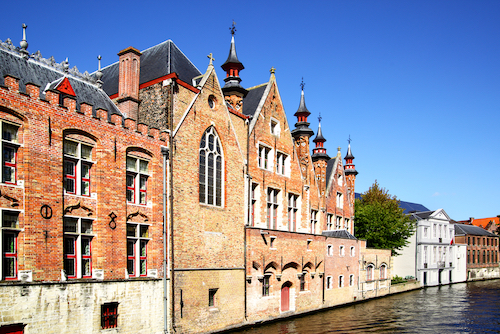The cost of medical procedures in Belgium will depend on one of four factors: whether you, as an expat resident:
• are signed up with the national insurance scheme
• have private health insurance
• have a combination of national and top-up private insurance to cover procedures (such as dental and optical care) which do not fall under the national scheme
• do not have insurance at all and are intending to pay out-of-pocket for any treatment that you receive.
We will look at each of these options in turn, and undertake some comparisons.
What is covered by state health insurance?
As an expat, you’ll be able to sign up for the national system as long as you are paying contributions into it, which are usually deducted from your salary, if you are working in the country.You have to sign up for national health insurance – it’s compulsory. Once you have registered with the social security system, you are eligible to sign up with a mutuelle/ziekenfonds. This will cover both you and your family. You can then register with a doctor and obtain a Global Medical Dossier, which will contain your medical history.
The state insurance scheme will cover
• a proportion of your medical fees
• a proportion of your dental fees
• prescriptions
• hospital care and treatment
• maternity costs
Some alternative treatments are covered, but not all: you can top up your policy to include them, however, and you can also obtain top-up cover for physiotherapy, speech therapy, nursing care, optometry and psychology. Under some schemes you can claim up to €150 a year for alternative treatments.
How does the national scheme work?
The Belgian health insurance system works on a co-pay reimbursement basis. The maximum co-payment is (in principle) 25% for general medical care and 40% for specialist services. So you won’t be reimbursed for the full fee.
You can see a specialist without a doctor’s referral but most people choose to go through their GP. You will also be entitled to visit an emergency room, but you might have to pay a small fee which is non-refundable (this is to discourage timewasters and people using emergency rooms as substitutes for a GP). Make sure you take your EHIC card, if you have one, or your eID with you, or you won’t be eligible for reimbursements.

The fees charged by a provider will depend on whether they are ‘conventioned’ or ‘unconventioned’ (conventionné/geconventioneerd):
• ‘Conventioned’ healthcare providers respect the official price set by the ‘Medicomut agreement’: an agreement between doctors and health insurance companies setting the official fees.
• ‘Non-conventioned’ healthcare providers charge supplements on top of the official price. These supplements will not be covered by compulsory insurance.
Many medical practitioners work within both the public and the private healthcare system.
How much do health procedures cost?
You should be able to claim back around 70% of your medical fees, for example, for a doctor’s visit. If you are hospitalized, you will need to pay a fixed sum for your accommodation, but your actual treatment fees will be covered by your insurer. You will also need to pay more if you opt for a single-occupancy room.
You may be entitled to higher reimbursements, depending on your income. The Belgian Department of Social Security says that the higher reimbursements scheme is granted if the gross annual income of the household does not exceed the ceiling of €17.855,56, increased by €3.305,54 per additional household member.
Those entitled to higher reimbursements receive them for medical care and medicines and a more favourable scheme for advance payments and the personal fee (patient fee) in case of hospitalisation.
The patient fee for the first day of hospitalization is around €27. There may be a gap between the amount reimbursed by the insurance company and the costs charged for overall hospital treatment, in which case a scheme termed ‘maximum billing’ is applied. This caps the amount of medical costs that you have to pay, thus providing a guarantee that only a fixed amount (determined on the basis of your family’s incomes) will be charged.

It is quite complex, however, so check with either the department of Social Security or your insurer. The ceiling is set at €357 (2017) when one family member has individually paid €450 of patient fees during each of the two preceding calendar years (e.g. €450 for 2016 and 2015). The amount of the patient fee will increase depending on your income, so for a maximum income of €47K, for example, you will have to pay around €1,800 for your patient fee.
Hospitals in Brussels are generally considered to be the most expensive in the country.
If you suffer from a chronic illness and your healthcare costs are likely to be high, you can apply for a lump sum allowance. You will need to discuss this with your health care fund, who will make the decision on your behalf.
If you are hospitalized, your costs will vary depending on the hospital and the doctor and they may even vary inside the hospital depending on the status of the doctor (e.g. ‘conventioned’ or not) and the type of room. You will pay on average €1,460 on average for inpatient care in a private room. A report from the Christian Health Insurance Fund showed that more than 60% of the bill (or €900) consisted of fee supplements: additional amounts above the fixed rate, added to the total charged to patients who opt for a single room. A visit to the emergency room (for example, for a suspected broken arm and an X ray) will cost around €100.

Make sure that you check with your doctor or hospital if they are registered with the state scheme, or if they are purely private.
Under the national scheme, you can also claim reimbursement for some forms of dental treatment. Dental fees are regulated according to the ‘Convention:’ an agreed, set scale of costs.
Finally, costs may be increasing: newspaper Het Nieuwsblad has reported that out-of-pocket charges are on the rise in Belgium, for example, for radiology and some scans and lab work.
Can I use my EHIC?
Your EHIC card can be used to cover you for emergency treatment in Belgium, but should not be used as a substitute for full health insurance.
Would you like to share your experience of life abroad with other readers? Answer the questions here to be featured in an interview!

